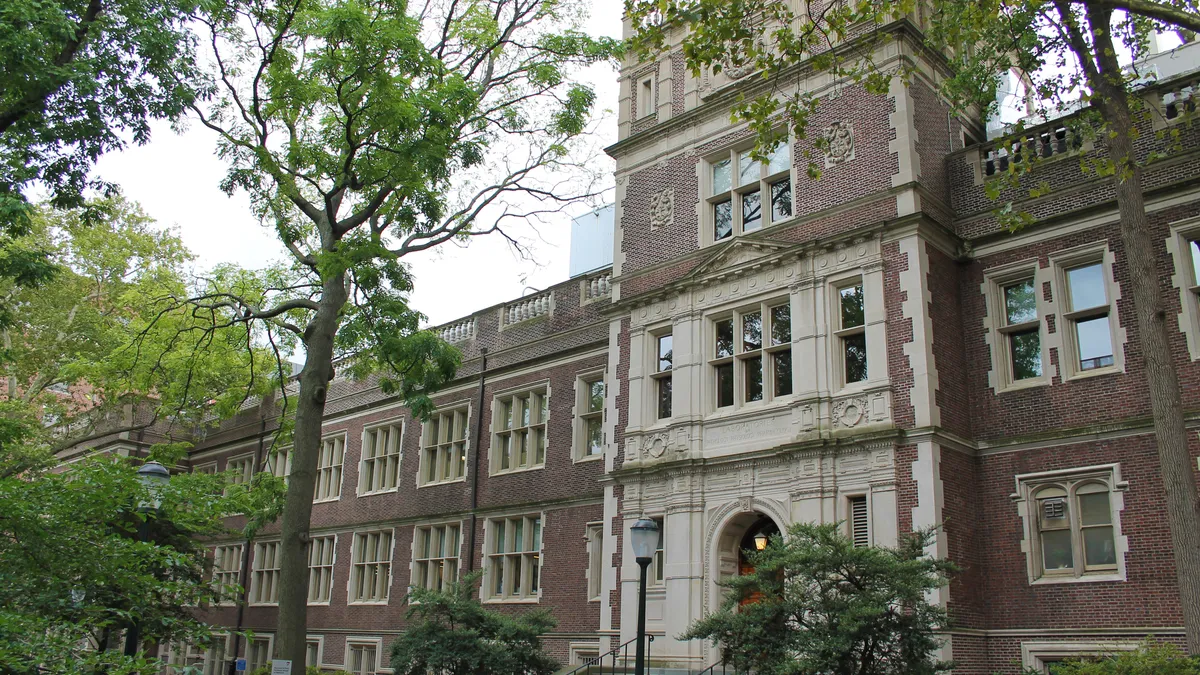Dive Brief:
- Four prominent medical schools — the University of Pennsylvania’s, Mount Sinai’s, and Stanford and Columbia universities’ — will no longer furnish data for U.S. News & World Report’s rankings, joining a contingent of law and medical programs rejecting the influential lists.
- Their withdrawal from U.S. News’ system comes after Harvard Medical School announced last week it will no longer participate in the rankings, arguing they incentivize institutions to misrepresent their programs. The quartet of Penn, Mount Sinai, Stanford and Columbia similarly said the rankings perpetuate a distorted vision of medical education.
- The medical schools’ dropouts, and those from several law schools last year, suggest persistent troubles for U.S. News’ rankings, which have long earned criticism for relying on questionable metrics, like peer surveys, and too heavily influencing institutional decision making.
Dive Insight:
Yale and Harvard law schools’ decisions in November to step away from the rankings shook higher education, which has historically considered the lists a flawed but seemingly indelible aspect of admissions and marketing.
First published in 1983, the U.S. News rankings have since exploded in prominence, particularly the undergraduate Best Colleges iteration. But they’ve also caught flak for using easily gamed factors and metrics that some critics deem irrelevant, like standardized test scores of an admitted class.
Colleges often trumpet their high placements on the rankings though, seeking to appeal to potential students, alumni and lawmakers who can send funding their way.
After Yale’s and Harvard’s law schools said they would no longer cooperate with the rankings, about two dozen others followed suit, according to the New York Law Journal.
The revolt appears far from over with the medical schools’ moves.
Dr. Katrina Armstrong, dean of Columbia’s Vagelos College of Physicians and Surgeons, wrote in a letter that the medical school rankings “perpetuate a narrow and elitist perspective on medical education” by prioritizing reputation and institutional wealth.
The focus is on that type of criteria “rather than measuring a school’s success in educating a diverse and well-trained cohort of doctors able to change medicine for the better and meet society’s needs,” Armstrong wrote.
Armstrong said the school remains committed to sharing information publicly for prospective students.
So too does the Stanford School of Medicine, its dean, Dr. Lloyd Minor, said in a statement. He said the medical school will start independently sharing data about its performance. The school will evaluate metrics like faculty accomplishments, as well as measurements students have found important, “including access to extensive patient care and research opportunities.”
He noted the medical school’s decision does not affect Stanford Health Care’s or Stanford Medicine Children’s Health’s participation in the U.S. News Best Hospitals rankings.
Penn’s medical school will also post information about itself online, it said in a statement.
The medical school rankings encourage institutions to pick students based on high grades and test scores, said Dr. J. Larry Jameson, dean of the medical school and executive vice president of the University of Pennsylvania for the Health System.
“Yet, we strive to identify and attract students with a wide array of characteristics that predict promise,” Jameson said. “The careers of transformative physicians, scientists, and leaders reveal the importance of other personal qualities, including creativity, passion, resilience, and empathy.”
Leaders of the Icahn School of Medicine at Mount Sinai, a prestigious private medical institution in New York, have long believed the rankings harm medical education, they said in a statement. They said the listings “lack accuracy, validity, and relevance.” The rankings also undermine the school’s core commitments, such as its pledge against racism, officials said.
A U.S. News spokesperson referred Higher Ed Dive to a statement Eric Gertler, its CEO and executive chair, made after Harvard medical school withdrew from the rankings.
In that statement, Gertler acknowledged there are challenges comparing diverse academic institutions across a common data set.
“That is why we have consistently stated that the rankings should be one component in a prospective student’s decision-making process,” Gertler said. “The fact is, millions of prospective students annually visit U.S. News medical school rankings because we provide students with valuable data and solutions to help with that process.”
U.S. News previously said it would still rank law schools regardless of if they cooperate. Much of the data used to rank the law schools exists publicly with the American Bar Association.










